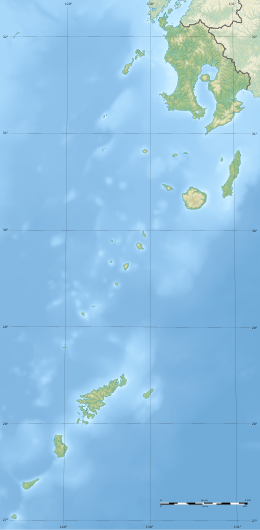| 喜界島地震 | |
  | |
| UTC time | 1911-06-15 14:25:53 |
|---|---|
| ISC event | 16958149 |
| USGS-ANSS | ComCat |
| Local date | 15 June 1911 (1911-06-15) |
| Local time | 23:26 |
| Magnitude | Ms 8.1 |
| Depth | 10 km (6.2 mi) |
| Epicenter | 28°42′N 130°36′E / 28.7°N 130.6°E / 28.7; 130.6 |
| Areas affected | Japan |
| Casualties | 12 deaths |
The 1911 Kikai Island earthquake (喜界島地震, Kikai-jima Jishin) occurred on June 15 at 23:26 local time (14:26 UTC). The epicenter of the earthquake was located near Kikai Island, Japan. It had a magnitude of Ms 8.1.
Overview
The earthquake occurred near the northern end of the deepest region in Ryukyu Trench. The hypocenter was located near 28.00°E, 130.00°N, about 30 km south of the Kikai Island, with a depth of about 100 km. However, due to the instrumental precision of that time, the location of the hypocenter was just an approximation, and estimations differ. A recent study estimated that the hypocenter was located near 28.90°E, 130.25°N, about 60 km NNE of the Kikai Island, with a depth of about 30 km. In 2013, another study reevaluated the location and depth of the earthquake and found that its hypocenter depth was 10 km. The reevaluation also relocated the epicenter location to 28.7°E, 130.6°N.
Twelve people were reported dead, including one on Kikai Island. Four hundred and twenty two houses were completely destroyed, 401 of which on Kikai Island. Damage was also reported on Amami Ōshima, Toku-no-shima, and Okinawa Island. The wall of Shuri Castle in Shuri was damaged. This earthquake could be felt as far as in Shanghai, China, Tainan, Taiwan (then under Japanese rule), and Fukushima, Japan.
Tsunami
The earthquake triggered a tsunami which was recorded on Kikai Island and Amami Ōshima. The tsunami was relatively small on the east coast of Kikai Island, but had a height of at least 5m on the west coast of Kikai Island and also in Amami Ōshima, and may have had a maximum height of over 10m in certain parts of Kikai Island.
See also
References
- ^ Goto, Kazuhiko (2013). "1911年に喜界島近海で発生した巨大地震の震源位置の再評価" [Re-evaluation of Hypocenter of the 1911 Great Earthquake around Kikai-jima, Japan]. Jishin (in Japanese). 65 (3): 231-242. doi:10.4294/zisin.65.231. ISSN 0037-1114. S2CID 130483208.
- Engdahl, E. R.; Vallaseñor, A. (2002). "Global seismicity: 1900–1999". International Handbook of Earthquake & Engineering Seismology. Part A, Volume 81A (First ed.). Academic Press. p. 672. ISBN 978-0124406520.
- "Seismotectonics of the Western Pacific region" by T. Seno
- Mogi, K. (1969). "Relationship between the occurrence of great earthquakes and tectonic structures" (PDF). Bulletin of the Earthquake Research Institute. 47. Earthquake Research Institute: 443. Archived from the original (PDF) on 2016-03-04. Retrieved 2013-02-26.
- ^ Goto, Kazuhiko (2012). "Hypocenter of the 1911 great earthquake occurred around Kikai-jima, Japan". Japan Geoscience Union Meeting 2012. Japan Geoscience Union.
- "過去の被害地震". jma-net.go.jp. Archived from the original on 2014-04-14. Retrieved 2013-02-26.
- "歴史地震研究会" (PDF).
- ^ "Archived copy" (PDF). Archived from the original (PDF) on 2013-10-20. Retrieved 2013-02-26.
{{cite web}}: CS1 maint: archived copy as title (link) - "本世纪上海地区地震概述及地震活动与断裂的关系" by 刘昌森
- Iwamoto K, Kazuhiko G (2013). Oral survey of the tsunami generated by the 1911 great earthquake (M8.0) that occurred around Kikai-jima, Japan. Japan Geoscience Union Meeting (in Japanese), Makuhari, Chiba, 19–24 May 2013. "岩本健吾、後藤和彦:1911年に喜界島近海で発生した巨大地震(M8.0)に伴う津波の聞き取り調査" (PDF). 日本地球惑星科学連合2013年資料
External links
- The International Seismological Centre has a bibliography and/or authoritative data for this event.
| Earthquakes in the 1910s | |
|---|---|
| 1910 |
|
| 1911 |
|
| 1912 | |
| 1913 |
|
| 1914 | |
| 1915 |
|
| 1916 | |
| 1917 |
|
| 1918 |
|
| 1919 |
|
| † indicates earthquake resulting in at least 30 deaths ‡ indicates the deadliest earthquake of the year | |